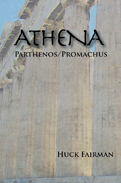
 |
To visit the ancient relics of the Greeks is an experience of a lifetime. Through vivid sensory details and unparalleled knowledge of Greece, its history, and architecture, Fairman transports his audience to this mesmerizing land of gods and temples. At one point or another, most couples find their relationship strained, and the joy simply draining away from their lives. Few, however, are like Wren and Belle, the protagonists of the novel, who try to save their relationship via their anniversary trip to Greece. While the premise could simply be viewed as a couple trying to save their marriage, Athena Parthenos/Promachus is much more; it is an eloquently written and engaging discussion on how one can regain the balance, fire, and the spirit of life back into their lives rather than tolerate the status quo.
In terms of plot, the tension between the main characters, expressed at times through nonverbal gestures, and at times through snappy, back-and-forth dialogue is portrayed with perfection. From the beginning scenes at a house party, Wren and Belle head in different directions. Wren, an architect, is enthused by the marvelous home on the sea—with its tunnel ceilings and arcing walls—where the party is held, and is entrenched in a conversation with its prominent architect, George Nestoros. On the other hand, Belle, who introduces herself to a group as Artemis, finds herself forming a close bond with Marcelina, Ileana, and Angela. In fact, upon seeing Wren walking with another woman on the beach, and having her own intellectually engaging conversation with a British millionaire, Henry—also known as Argos—she is convinced that change must happen. She decides to take a cruise aboard the Poseidon with the group that will allow her to experience the island sites in the Aegean Sea that she could only read about in her European studies.
Wren decides to go sightseeing, beginning with Delphi, while Belle hastily leaves a note informing Wren of the cruise. This moment essentially severs any attempts of reconciliation and triggers a series of events that help both Wren and Belle rediscover what it means to be alive. Fairman does an exceptional job of giving each character depth and empathy. Most couples are willing to quash the desires of their soul for their children and endure years-on-end a relationship that neither partner is willing to do justice to; Wren and Belle, up until now, were no different.
Belle's trip on the Poseidon is marred with further reason to distrust men, Henry in particular. In the process, Fairman conducts a riveting discussion on one of the main world issues: the treatment of women and the false pretense of gender equality, even in the advanced modern 21st century world. Sophisticated conversations on meaningful topics are a Fairman trademark and will undoubtedly intrigue readers who like healthy discussions on overlooked issues.
At its core, Athena Parthenos/Promachus is a story of discovery and resurrection of one's spirit. No part of the novel depicts this better than the experiences Wren encounters with the seemingly god-like Iscaria and the ensuing connection with Messena. This phase of the book is a philosopher's dream as Iscaria explains to Wren that she senses he is dying inside and is in desperate need of balance because "together man and woman are one." Interestingly, whether it is a reference to Odysseus and Penelope or the balance of power between Apollo and his sisters, Athena and Artemis, Fairman finds a way to connect the story to classical mythology. Messena, who is essentially a therapist, sees Wren and the two form an instant attraction. The harmony and introspective thought described during these scenes is both fascinating and comedic: On one hand, Messena is giving Wren love advice and how to reconnect with his wife, while clearly on the other, there are serious sparks going off that culminate in a moving dance scene.
What begins as a typical "let's try and patch this up” romantic plot evolves into an almost metaphysical exchange, a search for a new beginning and yearning that will immediately grab the reader's attention. There are times where the author, using words such as vituperation, exerts too much effort at being refined with his vocabulary. Nevertheless, these instances are few and far between and for the most part, there is an elegance, a grace with which the sentences flow that make the story both enjoyable and enriching.
RECOMMENDED by the US Review